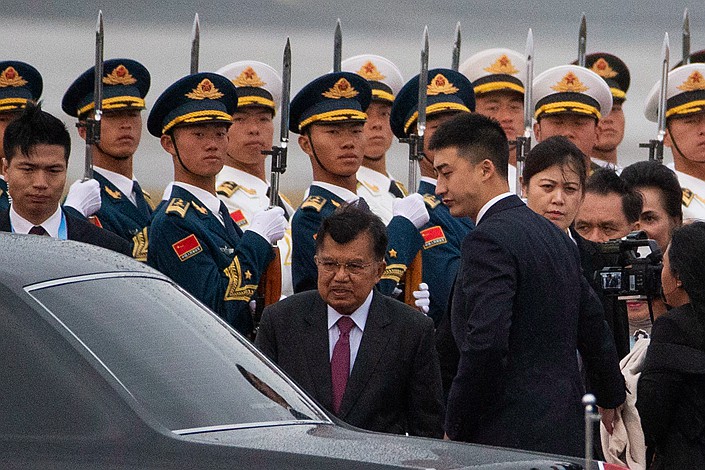Indonesia Calls For 'Belt and Road' Projects to be Private-Sector Driven

(The Straits Times) — Indonesia has said that projects under China's Belt and Road Initiative should be in line with its own national development strategy, be private sector-driven and not add to government debt.
These points would be emphasized in a speech at the second Belt and Road Forum in Beijing, Indonesian Foreign Affairs Ministry spokesman Arrmanatha Nasir said in a media briefing in Jakarta on Thursday.
More than 5,000 government officials, including 37 heads of state, and business leaders are attending the three-day forum, which began on Thursday. The first BRI summit was held in 2017.
Indonesian Vice President Jusuf Kalla is leading Indonesia's delegation that includes Coordinating Minister for Maritime Affairs Luhut Pandjaitan and Foreign Affairs Minister Retno Marsudi.
"From the beginning, Indonesia has stressed that BRI projects have to be private sector-driven, a business-to-business cooperation ... so it's profit-oriented. If it won't be profitable, it should not proceed. If there is any debt, it is a debt to the private sector," Arrmanatha said.
The Foreign Ministry spokesman said Mr Kalla would be speaking at the third or last of the three planned round table meetings at the forum which would discuss, among other things, boosting creativity and exploring new sources of growth, policy synergy and building closer partnership and promoting green and sustainable development.
The Indonesian government has offered several strategic projects under the BRI, including a multibillion-dollar hydropower plant in North Kalimantan's Kayan river and an industrial park in North Sumatra.
Jakarta has refused to provide any government guarantee for the projects and opted instead to leave them to the private sector, albeit mainly state-controlled corporations. This is unlike most BRI projects in other countries.
Many projects in Indonesia with strong Chinese government support have not been listed as BRI projects. These include the ongoing 150 km (93 mile) Jakarta-Bandung high-speed rail project, the first in Indonesia, which is partially financed by the China Development Bank.
Another example is a nickel industrial park in Morowali, Central Sulawesi province, which has immensely benefited the local economy as exports from the province jumped sixteenfold over the past five years. The project was initiated before the BRI was launched, received strong endorsement from the leaders of both countries and enjoyed commercial financing from the state-owned China Development Bank.
"None of our cooperation is G-to-G. What we do is corporation-to-corporation (between those from China and Indonesia) working directly on projects," Mr Luhut said in a statement sent from Beijing.
"The government's role here is just to facilitate," he added.
The BRI — the signature foreign policy and development strategy of Chinese President Xi Jinping — aims to revive ancient overland and sea trade routes, and connect China to Europe, Africa and other parts of Asia by building a network of ports, roads, railways and industrial hubs.
Mooted by Xi in 2013, Beijing said recently that it has inked 173 deals with 125 countries and 29 international organizations on the mega-project which has been marked by controversy over the unsustainable debt that poorer countries will or have chalked up.
Pakistan downsized a key Belt and Road railway project over debt concerns after Prime Minister Imran Khan took office last year while Malaysia recently successfully renegotiated on the East Coast Rail Link, bringing cost down from US$16 billion ($21.8 billion) to US$10.7 billion.
Critics have also often pointed to the construction of the Hambantota port in Sri Lanka, which began as a joint venture with China in 2008. But Sri Lanka was unable to repay the loan and was forced to cede control of the deep-sea port to Chinese firms on a 99-year lease.
This story was originally published by The Straits Times.
Contact editor Yang Ge (geyang@caixin.com)

- 1China Officials Dismiss Tax Hike Rumors After Tech Selloff
- 2Cover Story: How Gutter Oil Became a Prized Fuel for International Airlines
- 3Maersk Unit Takes Over CK Hutchison Panama Ports After Court Ruling
- 4Prominent Chinese Journalist Liu Hu Detained by Police in Chengdu
- 5China Provinces Set Cautious 2026 Growth Targets
- 1Power To The People: Pintec Serves A Booming Consumer Class
- 2Largest hotel group in Europe accepts UnionPay
- 3UnionPay mobile QuickPass debuts in Hong Kong
- 4UnionPay International launches premium catering privilege U Dining Collection
- 5UnionPay International’s U Plan has covered over 1600 stores overseas






